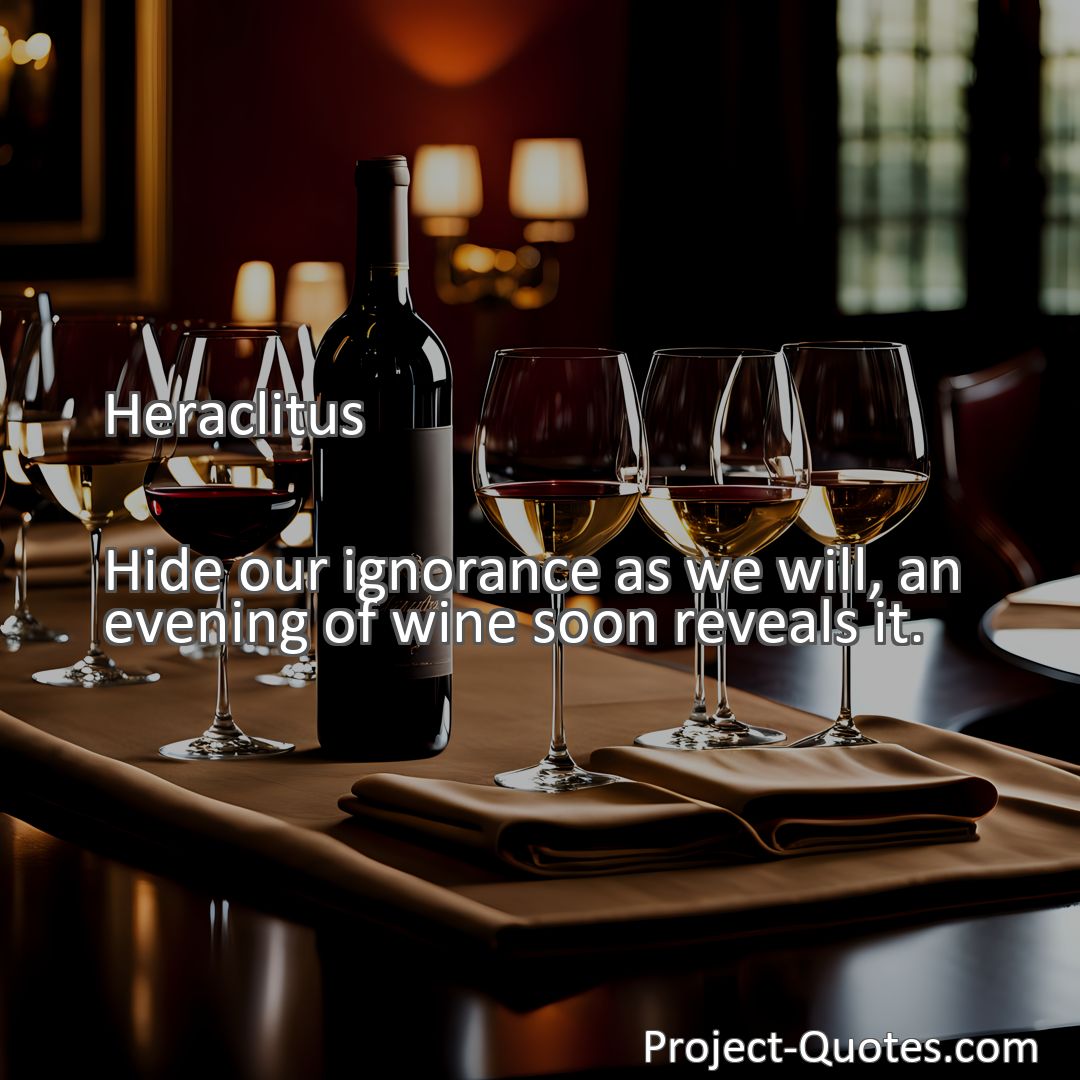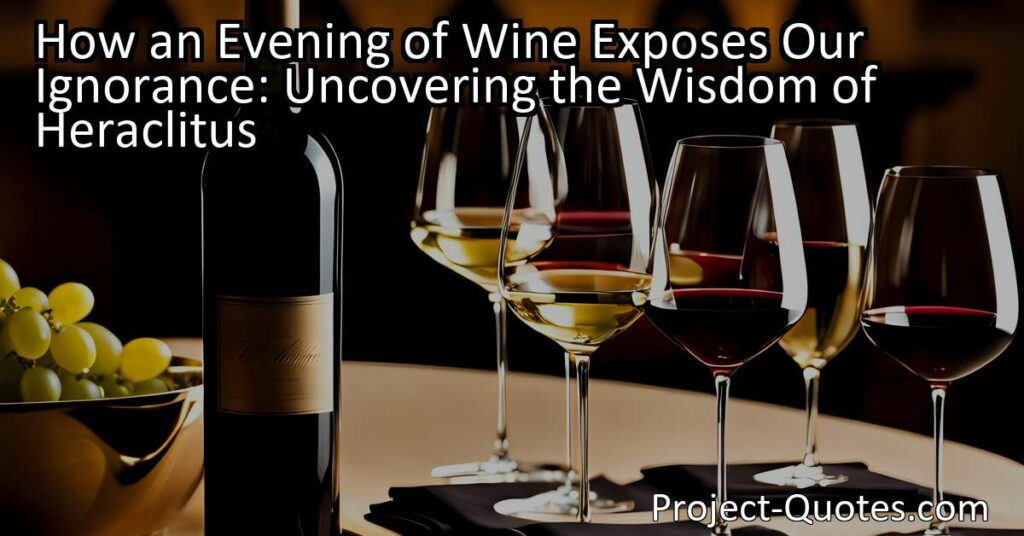Hide our ignorance as we will, an evening of wine soon reveals it.
Heraclitus
How an Evening of Wine Exposes Our Ignorance: Embracing the Truth of Heraclitus In an evening of relaxation and indulgence with a glass of wine, Greek philosopher Heraclitus believed that our ignorance becomes exposed, no matter how hard we try to conceal it. As we let go of our inhibitions, our true understanding (or lack thereof) shines through. Embracing our limitations and being open to growth can lead us on a path towards wisdom and enlightenment.
Table of Contents
Meaning of Quote – Hide our ignorance as we will, an evening of wine soon reveals it.
Have you ever tried to pretend to know about something when you really didn’t? Maybe you were in a conversation with friends or family, and a topic came up that you weren’t familiar with. Rather than admitting your ignorance, you attempted to hide it by nodding along and hoping nobody would notice. Well, according to the wise ancient philosopher Heraclitus, no matter how hard we try to conceal our lack of knowledge, it eventually becomes exposed, especially when we indulge in a glass of wine during an evening of relaxation.
Heraclitus, a Greek philosopher who lived around 500 BCE, believed that true knowledge and wisdom could only be attained through self-reflection and embracing change. He often observed the world around him and found deep meaning in ordinary occurrences. In the case of his quote, “Hide our ignorance as we will, an evening of wine soon reveals it,” Heraclitus seems to suggest that our true understanding, or lack thereof, is inevitably uncovered when we let loose and engage in the leisurely activity of drinking wine.
Now, it’s important to note that Heraclitus didn’t specifically mean that alcohol consumption directly exposes our ignorance. Instead, he used the idea of an “evening of wine” as a metaphor for letting go of our inhibitions and revealing our true selves. In this context, the wine symbolizes a loosening of our mental faculties, allowing our true knowledge (or lack thereof) to shine through.
Imagine a group of friends gathering for a relaxing evening, the clinking of glasses and the sound of laughter filling the air. As the night progresses and the wine flows, conversations delve into different topics, from history to current events. Some individuals confidently share their expertise on subjects they are knowledgeable about, impressing others with their insights and understanding. On the other hand, someone attempting to hide their ignorance might start to stumble with their words, providing vague or incorrect information. Their lack of genuine understanding becomes evident to those around them.
This scenario perfectly captures Heraclitus’ idea that our ignorance cannot be concealed indefinitely. It is as if the wine acts as a truth serum, revealing the gaps in our knowledge. But why does this happen? Is it simply the effects of alcohol impairing our cognitive abilities? While alcohol does impact our judgment and inhibitions, Heraclitus’ quote suggests a deeper psychological truth.
Hiding our ignorance is a natural human tendency. We often feel embarrassed or inadequate when we don’t possess the answers or information others expect of us. So, we attempt to compensate by pretending to know more than we actually do. However, this façade is difficult to maintain, especially when we find ourselves in an environment that promotes openness and authenticity, such as an evening with friends over a glass of wine.
When we are relaxed, our minds become more vulnerable, and our true selves begin to emerge. We may feel more comfortable sharing our thoughts and opinions, even if they betray our limited understanding of a subject. This authenticity can be refreshing, as it allows us to connect on a genuine level with those around us. However, it can also lead to moments of embarrassment or self-doubt when our lack of knowledge becomes apparent.
Yet, perhaps there is a silver lining to Heraclitus’ observation. By acknowledging and accepting our ignorance, we open ourselves up to the opportunity for growth and learning. Only when we let go of the fear of being exposed can we truly embrace the pursuit of knowledge. Each revelation of our ignorance becomes a catalyst for seeking out new information and expanding our understanding of the world.
In this sense, an evening of wine becomes a metaphorical journey of self-discovery. It teaches us the importance of humility, reminding us that there will always be aspects of life we don’t fully grasp. Instead of fearing or hiding our ignorance, we can choose to approach it with curiosity and a willingness to learn. By doing so, we elevate our intellectual growth and develop a deeper appreciation for the vast expanse of knowledge that lies beyond our current understanding.
So, the next time you find yourself engaging in an evening of wine or any social gathering, remember Heraclitus’ words. Embrace the opportunity to reveal your true self, both the knowledgeable and not-so-knowledgeable sides. Let go of the need to hide your ignorance and instead, view it as an invitation to expand your horizons.
In the end, our goal should not be to accumulate knowledge for the sake of appearing intelligent but rather to seek wisdom and understanding for our own personal growth. By being open to our own limitations and vulnerabilities, we can participate in conversations and experiences with honesty and authenticity. So, raise a glass, be true to yourself, and let the evening of wine serve as a reminder that our ignorance is a conduit to enlightenment.
I hope this quote inspired image brings you hope and peace. Share it with someone who needs it today!


